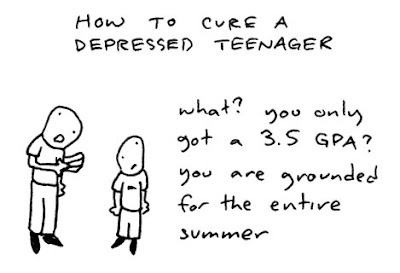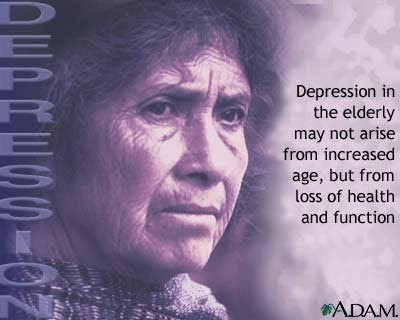 Are you depressed?
Are you depressed?
What makes you so depressed?
Causes of depression
Ø The High Price of a Broken Heart
Ø Postpartum Depression
Ø Seasonal Affective Disorder (SAD)
Ø Up All Night, Down All Day
What is depression? Depression is an illness that causes a person to feel sad and hopeless much of the time. It is different from normal feelings of sadness, grief, or low energy. Anyone can have depression. It often runs in families. But it can also happen to someone who doesn't have a family history of depression. You can have depression one time or many times.
Depression is an illness that causes a person to feel sad and hopeless much of the time. It is different from normal feelings of sadness, grief, or low energy. Anyone can have depression. It often runs in families. But it can also happen to someone who doesn't have a family history of depression. You can have depression one time or many times.
 What Happens
What Happens
From health wise, depression may begin with symptoms of anxiety (such as excessive worrying) or symptoms such as sadness or lack of energy that last for days or months before the onset of full-blown depression. You may have trouble concentrating or remembering, experience a loss of pleasure in things you used to enjoy, feel hopeless, and have low energy and changes in sleeping and eating patterns. You may withdraw socially from others and lose interest in sexual activity.
The cause of depression varies from one person to another. You might have mild or severe symptoms of depression for a long time, or you may have them for a brief time. A small number of people feel depressed for most of their lives and require ongoing treatment. Most people who have depression can be treated successfully with medication, professional counseling, or a combination of the two.

Depressive disorders are classified according to their severity and duration. Depression may be mild, moderate, or severe. It may start suddenly (acute) or be long-lasting (chronic). Dysthymic disorder, for example, is chronic mild depression. Some people may experience an episode of major depression on top of dysthymic disorder (double depression).
For severe depression, you may need to be admitted to a hospital for a short time, especially if you are having thoughts of suicide. Because depression puts you at a higher risk for attempting suicide, you should seek immediate treatment if you are having self-destructive thoughts.
 Recurring illness
Recurring illness
Depression often recurs. If you have one episode of depression, you are more likely to become depressed again at some point in your life than someone who has never been depressed. The risk of having another episode of depression increases with each additional episode.
Related illness Depressed people who have a chronic illness such as diabetes or coronary artery disease suffer more from symptoms of their illnesses, are less able to function, have a decreased quality of life, and pay more in medical costs. People with depression are less likely to take good care of themselves, and this may make their health worse.
Depressed people who have a chronic illness such as diabetes or coronary artery disease suffer more from symptoms of their illnesses, are less able to function, have a decreased quality of life, and pay more in medical costs. People with depression are less likely to take good care of themselves, and this may make their health worse.
Sometimes episodes of depression are preceded or followed by periods of high energy (mania). If you cycle between depression and mania, you may have a condition called bipolar disorder. If you have depression only during certain seasons of the year, such as seasonal time of the months, you may have Seasonal Affective Disorder (SAD).
SymptomsFrom health wise, if you also have a depression, you may feel hopeless and sad or stop feeling pleasure from almost everything you do. You may feel down in the dumps, tearful, or discouraged. You may also be irritable or anxious or have low energy levels. The symptoms of depression are often subtle at first. It can be hard to recognize that symptoms may be connected and that you might have depression.
Ø The High Price of a Broken Heart
Ø Postpartum Depression
Ø Seasonal Affective Disorder (SAD)
Ø Up All Night, Down All Day
What is depression?
 Depression is an illness that causes a person to feel sad and hopeless much of the time. It is different from normal feelings of sadness, grief, or low energy. Anyone can have depression. It often runs in families. But it can also happen to someone who doesn't have a family history of depression. You can have depression one time or many times.
Depression is an illness that causes a person to feel sad and hopeless much of the time. It is different from normal feelings of sadness, grief, or low energy. Anyone can have depression. It often runs in families. But it can also happen to someone who doesn't have a family history of depression. You can have depression one time or many times. What Happens
What HappensFrom health wise, depression may begin with symptoms of anxiety (such as excessive worrying) or symptoms such as sadness or lack of energy that last for days or months before the onset of full-blown depression. You may have trouble concentrating or remembering, experience a loss of pleasure in things you used to enjoy, feel hopeless, and have low energy and changes in sleeping and eating patterns. You may withdraw socially from others and lose interest in sexual activity.
The cause of depression varies from one person to another. You might have mild or severe symptoms of depression for a long time, or you may have them for a brief time. A small number of people feel depressed for most of their lives and require ongoing treatment. Most people who have depression can be treated successfully with medication, professional counseling, or a combination of the two.

Depressive disorders are classified according to their severity and duration. Depression may be mild, moderate, or severe. It may start suddenly (acute) or be long-lasting (chronic). Dysthymic disorder, for example, is chronic mild depression. Some people may experience an episode of major depression on top of dysthymic disorder (double depression).
For severe depression, you may need to be admitted to a hospital for a short time, especially if you are having thoughts of suicide. Because depression puts you at a higher risk for attempting suicide, you should seek immediate treatment if you are having self-destructive thoughts.
 Recurring illness
Recurring illnessDepression often recurs. If you have one episode of depression, you are more likely to become depressed again at some point in your life than someone who has never been depressed. The risk of having another episode of depression increases with each additional episode.
Related illness
 Depressed people who have a chronic illness such as diabetes or coronary artery disease suffer more from symptoms of their illnesses, are less able to function, have a decreased quality of life, and pay more in medical costs. People with depression are less likely to take good care of themselves, and this may make their health worse.
Depressed people who have a chronic illness such as diabetes or coronary artery disease suffer more from symptoms of their illnesses, are less able to function, have a decreased quality of life, and pay more in medical costs. People with depression are less likely to take good care of themselves, and this may make their health worse.Sometimes episodes of depression are preceded or followed by periods of high energy (mania). If you cycle between depression and mania, you may have a condition called bipolar disorder. If you have depression only during certain seasons of the year, such as seasonal time of the months, you may have Seasonal Affective Disorder (SAD).
SymptomsFrom health wise, if you also have a depression, you may feel hopeless and sad or stop feeling pleasure from almost everything you do. You may feel down in the dumps, tearful, or discouraged. You may also be irritable or anxious or have low energy levels. The symptoms of depression are often subtle at first. It can be hard to recognize that symptoms may be connected and that you might have depression.
 The two most significant symptoms of depression are:
The two most significant symptoms of depression are:> Sadness or hopelessness.
> Loss of interest in or pleasure from most daily activities.
 Other symptoms include:
Other symptoms include:> Losing or gaining weight because of changes in appetite.
> Sleeping too much or not enough.
> Feeling restless and unable to sit still, or feeling that moving takes a great effort.
> Feeling tired all the time.
> Feeling unworthy or guilty without an obvious reason.
> Having problems concentrating, remembering, or making decisions.
> Thinking often about death or suicide.

If you have at least five of these symptoms for 2 weeks or longer, and one of the symptoms is either sadness or loss of interest, you may be diagnosed with major depression that needs treatment. Even if you have fewer than five symptoms, you may still be depressed and need treatment. If you have 2 to 4 symptoms for a period of at least 2 years (1 year for a child), you may have a long-term form of depression called dysthymic disorder (dysthymia).
 Many women experience mood changes before menstruation. Physical and emotional premenstrual symptoms that interfere with relationships or responsibilities are known as premenstrual syndrome (PMS). However, women who have emotional and physical premenstrual symptoms that seriously interfere with daily life may have a type of depression known as premenstrual dysphoric disorder (PMDD). Many health professionals see people with general symptoms that may be difficult to link to depression. These symptoms, which commonly occur with depression, include:
Many women experience mood changes before menstruation. Physical and emotional premenstrual symptoms that interfere with relationships or responsibilities are known as premenstrual syndrome (PMS). However, women who have emotional and physical premenstrual symptoms that seriously interfere with daily life may have a type of depression known as premenstrual dysphoric disorder (PMDD). Many health professionals see people with general symptoms that may be difficult to link to depression. These symptoms, which commonly occur with depression, include:
. Having headaches and other body aches and pains.
. Having digestive problems, including constipation or diarrhea.
. Losing interest in sex or being unable to perform sexually.
. Feeling anxious or worried without an obvious reason.
. Blaming yourself or others for your depression.
. Not moving or talking for hours.
Other symptoms of depression may include:
. Overeating and weight gain (rather than loss of appetite).
. Oversleeping (rather than insomnia).
. Increased tearfulness, anger, and generally not feeling well, along with anxiety and tension.
. Sometimes, a feeling of heaviness in the arms and legs.
. Sensitivity to rejection.
 Depression is a serious problem for people of any age, and older adults with symptoms of depression should seek treatment right away. Depression in older adults can cause confusion or forgetfulness (although some medications can cause these symptoms as well). Depression has also been identified as a significant risk factor for death in older adults with heart problems. It is important to recognize the early warning signs of depression so that you can get treatment.
Depression is a serious problem for people of any age, and older adults with symptoms of depression should seek treatment right away. Depression in older adults can cause confusion or forgetfulness (although some medications can cause these symptoms as well). Depression has also been identified as a significant risk factor for death in older adults with heart problems. It is important to recognize the early warning signs of depression so that you can get treatment.Interactive Tool: Are You Depressed?The symptoms of depression are often hard to notice at first. It can be hard to recognize that symptoms may be connected and that you might have depression. Symptoms of depression in children and teens are sometimes different from adult symptoms, which can make their depression more difficult to diagnose and treat.

Depression can lead to suicide? The warning signs of suicide change with age. Warning signs of suicide in children and teens may include preoccupation with death or suicide or a recent breakup of a relationship. Warning signs of suicide in adults may include alcohol or substance abuse, recent job loss, or divorce. Warning signs of suicide in older adults may include the recent death of a partner or diagnosis of a life-limiting illness.
 What Makes Us Happy?
What Makes Us Happy?What makes us truly happy? While some evidence suggests that happiness may be linked, in part, to relative wealth, how we’re doing compared to those around us, overall the old adage that money doesn’t buy happiness seems to hold true. If we can ever notice, we are materially so much better off than we were 50 years ago, but we’re not one much happier. Some may say that happiness is as more closely correlated with people rather than things. Its because we humans have
 a deep need to belong, to connect with others in close, supportive, intimate, caring relationships. People who have such close relationships are more likely to report themselves ‘very happy. Seems like there is list of eight factors that influence rates of happiness and depression. Many of these factors vary from city to city and region to region. Here’s your chance to see how your city compares.
a deep need to belong, to connect with others in close, supportive, intimate, caring relationships. People who have such close relationships are more likely to report themselves ‘very happy. Seems like there is list of eight factors that influence rates of happiness and depression. Many of these factors vary from city to city and region to region. Here’s your chance to see how your city compares.Happily Married
Unhappy marriage may also become a disaster and may further lead to highly tense depression. So, is getting married one of the keys to a happy life?
 Interestingly enough, the happy halo that shines over married couples isn’t the result of having kids, those with children were just as likely to be happy as those without. Rather, there seems to be something about marriage itself that boosts both men’s and women’s feelings of well-being in life. Recent research may suggests that people become less depressed
Interestingly enough, the happy halo that shines over married couples isn’t the result of having kids, those with children were just as likely to be happy as those without. Rather, there seems to be something about marriage itself that boosts both men’s and women’s feelings of well-being in life. Recent research may suggests that people become less depressed and less lonely after they get married, After all, it’s harder to be lonely when you’ve got a loved one to come home to every night. Men usually benefit even more than women from having a life-long companion. Women will talk to everyone, but most men tend to rely on their wives as their main confidant. In addition, women are typically the social planners in a relationship and ensure that the men stay connected to family and friends, another source of happiness. And what about all that nagging that wives are so famous for? Turns out it pays off. Men who are married drink less, smoke less, eat better, get more sleep, and engage in less risky behavior than their unmarried peers. The end result: Married men are healthier, and since health is linked to happiness, they’re happier too.
and less lonely after they get married, After all, it’s harder to be lonely when you’ve got a loved one to come home to every night. Men usually benefit even more than women from having a life-long companion. Women will talk to everyone, but most men tend to rely on their wives as their main confidant. In addition, women are typically the social planners in a relationship and ensure that the men stay connected to family and friends, another source of happiness. And what about all that nagging that wives are so famous for? Turns out it pays off. Men who are married drink less, smoke less, eat better, get more sleep, and engage in less risky behavior than their unmarried peers. The end result: Married men are healthier, and since health is linked to happiness, they’re happier too.
Live a happy and healthy life. Avoid depression. Get yourself tangled with those surround you and rest your soul to the Main Creator. Every one always needs a someone. No matter he/she is to you, always appreciate his/her company and time shared with you for those great sweet time or moments shared with you will carry some spark of hapiness and joy in you. Life is great and full of colours. Enjoy life at its best and appreciate what best God made for you. Its the entire world.

I thank God for this heal.
The fall and the strugle I have inside..
And the faith in the power of the Great Creator...that He never turns His back on me..the blessing He puts on me....
I thank Him for making me see.... the right way and granted me to stand strong on my own two feet again....
 Those surrounds you.... how many who could UNDERSTAND you?
Those surrounds you.... how many who could UNDERSTAND you?
For what have you been through...

1 comment:
Dysthymia is found twice as much in women as compared to men and this ratio does not depend on racial, ethnic or economic background. Until adolescence the rate of depression is not so much between boys and girls but after the age of approximately 12-13 it is more prevalent in girls, the reason could be the rapid changes in their physical, intellectual and hormonal constitution. http://www.xanax-effects.com/
Post a Comment